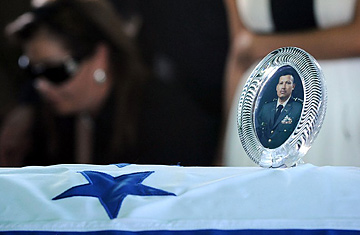
A picture stands atop General Julian Aristides Gonzalez's casket during his funeral in Tegucigalpa on Dec. 9, 2009, after hit men on a motorbike shot Gonzalez dead
The assassins came for Honduras' antidrug czar moments after he dropped his daughter off at school. His car was still in front of the schoolhouse when the two men drove up on a motorcycle and fired 11 bullets into Julian Aristides Gonzalez's body. His devastated wife rushed to the scene and kissed the corpse of the 57-year-old former general. He had been planning to retire within two months and move his family to Canada.
Gonzalez's murder last month is the latest sign that drug-related violence has intensified across Latin America, wreaking havoc from Mexico to Peru. And Honduras — a strategic transit point for U.S.-bound cocaine — has become ensnared in the vicious turf wars among Mexican trafficking cartels and those among Colombian producers. The turmoil in Honduras also reflects the impact of the U.S. drug war on the region's political divisions. Hours before his death, Gonzalez gave a news conference in which he accused the leftist Venezuelan government of turning a blind eye to Colombian guerrillas moving cocaine into Central America.
TIME conducted an in-depth interview with Gonzalez five days before he was murdered. Sitting in his office with 140 kilos of seized cocaine beside his desk, the square-jawed soldier explained the smuggling routes for the white powder with the aid of computer maps. Small aircraft were carrying bundles of cocaine from western Venezuela into Honduras, he said. His intelligence showed that the leftist Revolutionary Armed Forces of Colombia (FARC) were operating openly in Venezuelan territory and were behind many of the shipments. "The Venezuelan government is either incapable or complicit in this traffic," he said, speaking with a frankness uncommon among Latin American officials. His forces had found more than 50 such small planes within the past year.
Such accusations against the government of Hugo Chávez are not new. The U.S. and Colombia have for years accused Chávez of consorting with narco-terrorists. Chávez, for his part, claims that the U.S. smuggles drugs to fund its espionage. Gonzalez added his own bit of politico-narco conspiracy theory, suggesting that his country's ousted President, Manuel Zelaya, was under investigation for possible involvement with cocaine shipments, echoing a charge of Zelaya's political opponents. When TIME questioned whether a Honduran head of state could really have had his hands in trafficking, Gonzalez nodded his head firmly. "Oh, yes," he said. Zelaya has dismissed the allegation as nonsense.
Zelaya was overthrown earlier this year in a military coup and remains holed up in the Brazilian embassy in Tegucigalpa. The government installed by the coup also tossed out allegations that the leftist Zelaya, an ally of Chávez's, was a drug smuggler, but failed to produce any evidence to back the claim.
Gonzalez's more immediate problems came from the trafficking networks to the south and the even richer and more violent mafias from the north. In his six years as director general of the National Office for Combating Drug Trafficking, he had seen the presence of Mexican cartels explode in his country. "Almost all of the big Mexican organizations are carving out territory here. And when they run into each other, they will fight over it," he said. Among the Mexican gangs warring in Honduras are the Sinaloa Cartel of billionaire fugitive Joaquín (Shorty) Guzmán, the bloodthirsty paramilitary force known as Los Zetas and the quasi-religious mob calling itself La Familia, he said.
The Mexican cartels subcontract Honduran groups to move drugs for them — sometimes "executing" those accused of stealing the product, Gonzalez alleged. And they have also been buying up real estate and businesses to launder money and provide bases for operations. "We found one huge hacienda bought by Mexicans with landing strips for major aircraft," he said, showing the photo of a concrete runway built in a seized jungle property. The traffickers have also been unloading an increased amount of crack onto the Honduran market, which is sold on corners by street gangs like the Mara Salvatrucha, he said.
The drug conflicts have pushed up the Honduran murder rate, which hit 53 per 100,000 last year — one of the worst rates in the world. Few homicides are solved. Police do not have solid leads on Gonzalez's killers, who escaped on their motorcycle. Officials said they had offered the drug czar bodyguards, but he turned them down. "I would say to him, 'Are you not going to have security?'," his wife Leslie Portillo said at his funeral. "He replied to me, 'My security is God walking beside me.' "
